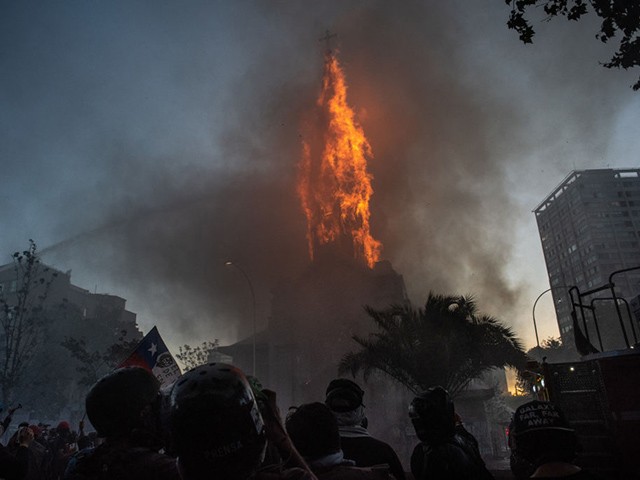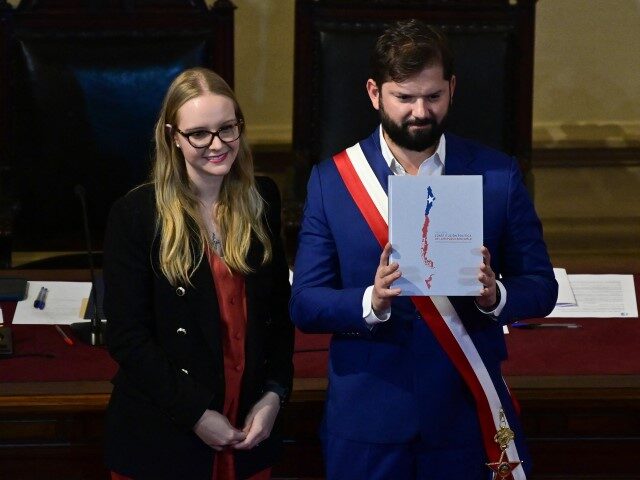The Chilean Constitutional Council presented on Tuesday the finalized text of a draft constitution to the nation’s far-left President Gabriel Boric – a draft written by a majority-conservative body of lawmakers that may replace the current constitution.
Boric immediately made the official call for a National Plebiscite, a popular vote on whether to adopt the document.
The conservative constitutional proposal will be up for approval via a mandatory national referendum on December 17. If approved, the text will replace Chile’s current core legal structure, implemented in 1980 during the dictatorship of Augusto Pinochet and amended 31 times in the past 43 years.
The proposal is the end result of the work of a predominantly conservative council elected in May that, using an initial draft prepared by a group of experts and lawmakers as a basis, worked to write the proposed new constitution.
The upcoming December plebiscite will mark the second back-to-back attempt at replacing the so-called “Pinochet Constitution” after Chile overwhelmingly rejected a far-left constitutional proposal in September 2022.

Demonstrators against a proposed new constitution celebrate after the results of the referendum to approve or reject the current constitution imposed during the dictatorship of Augusto Pinochet on September 4, 2022 in Santiago, Chile. The rejection of the new draft won over the approval after getting 62% of the votes. (Jonnathan Oyarzun/Getty Images)
Chile has been subjected to a long multi-year leftist campaign to replace its current constitution. The campaign originally began during the administration of former “center-right” President Sebastián Piñera in 2019. At the time, groups of leftist rioters took the streets to violently protest against a proposed four percent public transit fare hike. Although the public transit fare hike plans were rescinded, their demands ultimately escalated all the way to demanding a new constitution for Chile.
Piñera ultimately gave in to leftist demands for a new constitution, initiating a two-year process marked by continued violent protests and riots. The constitutional process was continued under the current administration of far-left President Gabriel Boric, who was a vocal supporter of the protesters’ campaign.

Firemen attempt to put out a church which has caught fire during a protest on October 18, 2020, in Santiago, Chile. (Claudio Santana/Getty)
That process, led by a majority far-left constitutional council, produced a constitutional proposal that was praised as the world’s “most progressive” core legal structure – and which counted with the open support of international leftist political figures such as Rep. Rashida Tlaib (D-MI), author Noam Chomsky, and British politician Jeremy Corbyn, as well as Hollywood celebrities such as Mark Ruffalo and Chilean-American actor Pedro Pascal.
The far-left constitutional proposal was overwhelmingly rejected by 61.86 percent of the Chilean electorate in September 2022. Nonetheless, Chileans expressed their willingness to carry out a second attempt, which ultimately backfired for the nation’s leftists as a majority conservative council was elected to work on the new draft.
Unlike the failed 2022 far-left proposal, which sought to implement the decriminalization of abortion at a constitutional level, the text of the new proposal states that “the law protects the life of the unborn.” Some other major changes include the addition of border control provisions that allow for the expulsion “in the shortest possible time” of migrants who enter through unauthorized routes, a reduction of the number of Congress seats, and the establishment of a prosecutor’s office for organized crime.
Beatriz Hevia, the Council’s president, officially delivered the proposal to Boric at Tuesday’s event, inviting Chileans to “forget the sad spectacle of division and confrontation that the past process left us with.”
Upon officially receiving the new conservative constitutional proposal, Boric issued a brief speech in which he ensured that if the proposal is approved, his government will work towards its implementation, but if it is rejected, he will “continue working and governing for the welfare of the people.”
“We know that constitutions do not solve immediate problems, but they should provide a framework for this to happen through public policy,” Boric said. “Constitutions define, in many cases, the meaning and limits of these policies.”
Last week, Boric stated that he would not campaign against the proposal, stressing that he is “not going to be the antagonist some people expect.”
Boric’s remarks were followed by statements issued by leftist political parties that are part of the ruling government coalition, all of whom expressed their intention to vote against the proposal in the upcoming December referendum.
Polls released at the end of October suggest that the conservative proposal will fail to pass, with only 30.3 percent of respondents expressing their support against 69.7 percent who answered they were against it.
Regardless of the outcome, the December 1 referendum is considered to be a defeat for Chilean leftists, as they will have to choose between adopting the new conservative constitution proposal or keep “Pinochet’s Constitution,” which they have spent years trying to replace.
The Chilean Minister General Secretariat of Government Camila Vallejo expressed in October that “there would hardly be conditions in this government” to carry out a third attempt at replacing Chile’s constitution if the current proposal fails to pass in December.
Christian K. Caruzo is a Venezuelan writer and documents life under socialism. You can follow him on Twitter here.

COMMENTS
Please let us know if you're having issues with commenting.